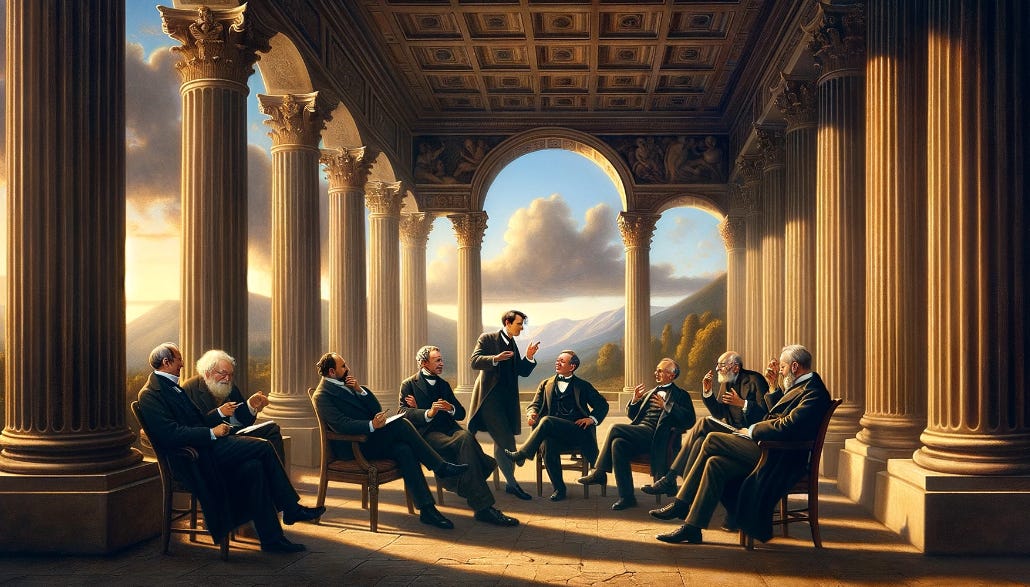"Slouching Towards Utopia": The Sean Illing "Grey Area" Interview
We cover von Hayekian vs. Polanyian imperatives in the context of successive waves of Schumpeterian creative destruction; I have long thought that successful execution of my book project would have required giving much more pride of place to Schumpeter; I am starting to think that I should also have included a focus on a trinity of economists: Keynes, Beveridge, & Pigou to adjust the liberal system to compensate for macroeconomic externalities, income-distribution externalities, and plain-old externality externalities; & I am starting to think I should have done much more with modes of societal organization—market, bureaucracy, democracy, and whatever we think “civil society” is…
<https://megaphone.link/VMP2764898237>
Sean Illing talks with me about Slouching Towards Utopia <bit.ly/3pP3Krk> and my claim that the “long twentieth century” was the most consequential period in human history. It saw the creation of the institutions enabling and supporting rapid technological growth and full globalization. It set humanity on a path towards improving life, defeating scarcity, and—perhaps—enabling real freedom.
But… this has run into some problems…
Sean and I talk about the power of markets, how the New Deal led to something approaching real social democracy, and why the Great Recession of 2008 and its aftermath—perhaps—is a herald of the possible end of this momentous era, plus many, many other topics.
References:
Slouching Towards Utopia: An Economic History of the Twentieth Century by J. Bradford DeLong (Basic; 2022)
The Road to Serfdom by Friedrich von Hayek (1944)
The Great Transformation by Karl Polanyi (1944)
Capitalism, Socialism and Democracy by Joseph Schumpeter (1942)
“A Short History of Enclosure in Britain” by Simon Fairlie (This Land Magazine; 2009)
“China’s Great Leap Forward” by Clayton D. Brown (Association for Asian Studies; 2012)
What Is Property? by Pierre-Joseph Proudhon (1840)
The Rise and Fall of the Neoliberal Order by Gary Gerstle (Oxford University Press; 2022)
Apple’s “1984” ad (YouTube)
The General Theory of Employment, Interest and Money by John Maynard Keynes (1936)
“The spectacular ongoing implosion of crypto’s biggest star, explained” by Emily Stewart (Vox; Nov. 18)
“Did Greenspan Add to Subprime Woes? Gramlich Says Ex-Colleague Blocked Crackdown” by Greg Ip (Wall Street Journal; June 9, 2007)
“Families across the country are tightening their belts and making tough decisions. The federal government should do the same,” from President Obama’s 2010 State of the Union Address (Jan. 27, 2010)
“The Eighteenth Brumaire of Louis Bonaparte” by Karl Marx (1852)
Why We’re Polarized by Ezra Klein (Simon & Schuster; 2020)
The Paradox of Democracy: Free Speech, Open Media, and Perilous Persuasion by Zac Gershberg and Sean Illing (U. Chicago; 2022)
This episode was made by:
Producer: Erikk Geannikis
Editor: Amy Drozdowska
Engineer: Patrick Boyd
Editorial Director, Vox Talk: A.M. Hall
SubTuring BradBot reports:
In this Grey Area Podcast with Sean Illing, Brad DeLong discusses his book Slouching Towards Utopia <bit.ly/3pP3Krk>. Illing and DeLong delve into the tension between economic growth and sustainable resource distribution, discussing the perspectives of Friedrich von Hayek and Karl Polanyi. Throughout the podcast, DeLong emphasizes the importance of historical perspective in understanding our current economic and social dilemmas. He advocates for a more inclusive and equitable economic model that can harness technological advancements for the common good,
They explore the rise of social democracies post-World War II, the impact of neoliberalism, and the challenges posed by the Great Recession in 2008. DeLong criticizes the response to the 2008 financial crisis and suggests that a more ambitious approach, similar to the New Deal, could have been more effective.
They embark on a journey that starts with the inception of what DeLong terms the “Long Twentieth Century,” marked by an unparalleled surge in human productivity and wealth creation. This period, beginning around 1870, is characterized by the convergence of technological innovation, the expansion of global trade networks, and the evolution of corporate and governmental structures to manage and further these developments. DeLong highlights the explosion in productivity and technological advancement beginning around 1870, driven by the emergence of the industrial research lab, the modern corporation, and globalization. The increase in productivity was not just a matter of economic statistics but had profound implications for the quality of human life, expanding possibilities and reshaping expectations.
The conversation delves into the mechanisms of this transformation, emphasizing the role of market economies in driving innovation and efficiency but also recognizing their limitations in ensuring equitable distribution and sustainable development. The discussion then shifts to the challenges of managing the fruits of this economic growth. DeLong and Illing explore the tension between capitalism’s ability to generate wealth and its propensity to concentrate that wealth, leading to inequality and social unrest. They discuss various historical moments and policies that aimed to address these disparities, including the New Deal, the welfare state, and more recent neoliberal reforms. DeLong is critical of the neoliberal consensus, arguing that while it succeeded in some respects, it also led to increased inequality and neglected the need for robust social safety nets.
Throughout the podcast, DeLong’s insights are framed by his deep understanding of economic history and his optimistic belief in human capacity to adapt and innovate. The dialogue is enriched by Illing’s probing questions and the exploration of counterfactual scenarios, which illuminate the complexities and contingencies of historical development.
The conversation also covers the role of government in regulating and guiding economic development. DeLong argues that effective governance is crucial for harnessing the benefits of market economies while mitigating their excesses and failures. He points to historical examples where government intervention helped stabilize economies, promote social welfare, and spur innovation, suggesting that a balanced approach is necessary for sustainable progress.
DeLong argues that this period was pivotal in human history, leading to unprecedented economic growth but also to significant challenges in equitable distribution and effective resource utilization. This rapid progress has on one hand has lifted billions out of poverty and enabled a standard of living for many that was inconceivable in earlier times; on the other hand, it has led to significant disparities in wealth and power, both within and across nations.
Illing and DeLong further discuss the global dimension of the long twentieth century, including the impact of colonialism, the Cold War, and globalization on economic development. They reflect on the rise of China and India as economic powerhouses and the challenges of integrating emerging economies into a global system that is equitable and sustainable.
A significant portion of their discussion is dedicated to examining the philosophical underpinnings of economic policy. DeLong, through his historical lens, critiques the neoliberal wave that took hold in the late 20th century, arguing that it prioritized efficiency and market freedom at the cost of equity and social welfare. Its emphasis on deregulation and market primacy often overlooked the necessity for robust social safety nets and equitable growth strategies. He contrasts this with the post-World War II consensus around social democracy. This critique is particularly poignant in his analysis of the 2008 financial crisis and its aftermath, where he suggests that the response lacked the ambition and scale of New Deal-era policies, leading to a slow and uneven recovery.
One of the most compelling parts of the conversation is the discussion on the potential end of the long twentieth century, marked by the financial crisis of 2008 and the growing threats of global warming, nuclear proliferation, and political extremism. DeLong expresses concern about the future, emphasizing the need for innovative solutions to address these existential challenges. He argues for a renewed commitment to social justice, environmental sustainability, and global cooperation, suggesting that the lessons of the past century can guide us in facing the uncertainties of the future.
As the conversation shifts to the present and future, DeLong and Illing discuss the implications of the digital and biotechnological revolutions. The conversation also touches on the potential for a new economic paradigm, driven by advances in information and biotechnology.
A critique of the arguments expressed wsould focus on several key themes:
Technological Progress and Economic Growth: While the achievements in the 1870-2010 era are undeniable, DeLong might underemphasize the associated costs, such as environmental degradation, the widening wealth gap, and the displacement of traditional industries and livelihoods. Technological advancements, while driving economic growth, have not equally benefited all segments of society equally, leading to increased socio-economic disparities.
Market Economies and Social Values: DeLong perhaps focuses too much the efficiency of market economies in allocating resources. While he highlights the challenge of ensuring that market prices reflect social values, he could have done more to explore the limitations of market mechanisms in addressing social and environmental issues. DeLong might overestimate the ability of markets to self-correct and align with broader societal values without significantly greater regulatory intervention.
Political and Economic Systems: The discussions of the impact of the Great Depression, the rise of social democracy, and the shift towards neoliberalism raises questions about the adequacy of DeLong’s analysis of political ideologies and their impact on economic policies and outcomes. He might oversimplify the complex interactions between political movements and economic theories, potentially overlooking the nuances of how these ideologies adapt and change in response to societal needs and challenges.
Contemporary Challenges: DeLong’s engagement with issues like global warming and political polarization fails to accomplish an in-depth exploration of the systemic changes required to address these challenges effectively. DeLong’s optimism about the potential for future paradigms to solve these problems may underestimate the inertia within political and economic systems that resist change.
Historical Analysis and Future Outlook: DeLong’s focus on economic growth and technological progress overshadows other critical factors, such as cultural shifts, geopolitical dynamics, and the role of non-economic actors in shaping the 20th century. Additionally, the critique could question the adequacy of the historical lens used to predict future trends, considering the unprecedented nature of contemporary challenges.


